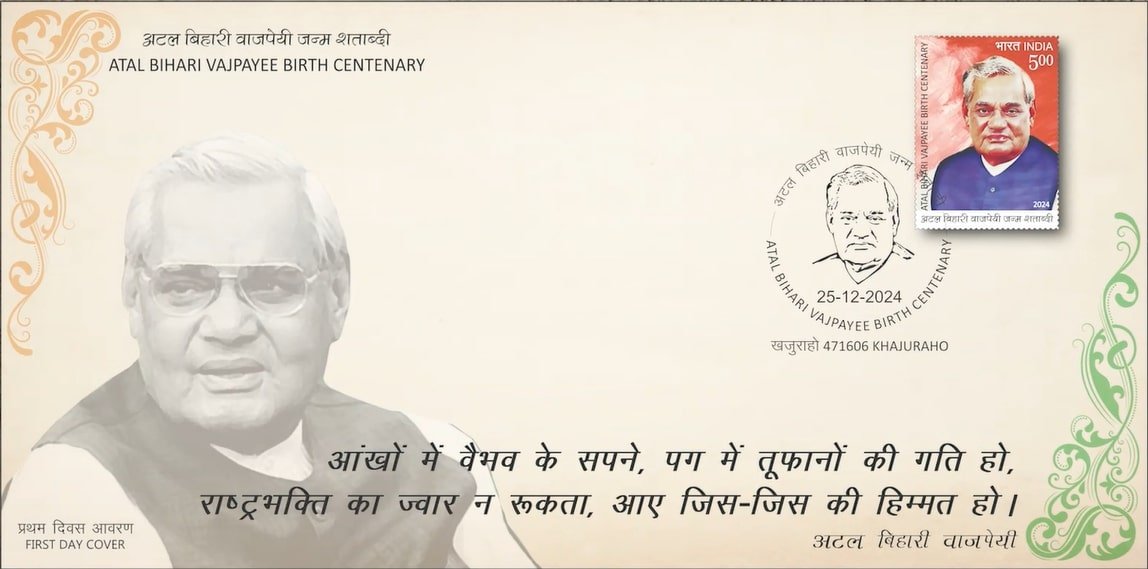Atal Bihari Vajpayee Birth Centenary

Technical Data
| Stamp Set | Atal Bihari Vajpayee Birth Centenary |
|---|---|
| Date of Issue | December 25, 2024 |
| Denomination | Rs. 5 |
| Quantity | 202,800 |
| Perforation | 14½ |
| Printer | Security Printing Press, Hyderabad |
| Printing Process | Wet Offset |
| Watermark | No Watermark |
| Colors | Multicolor |
| Credit (Designed By) | Ms. Nenu Gupta |
| Catalog Codes |
Stanley Gibbons IN 3930 Colnect codes IN 2024.12.25-01 |
| Themes | Anniversaries and Jubilees | Famous people | Men | Politicians | Prime Ministers |
Shri Atal Bihari Vajpayee was one of India’s most respected and beloved leaders, a towering figure in Indian politics whose vision, eloquence and dedication to public service shaped the course of the nation. Born on December 25, 1924, in Gwalior, Madhya Pradesh, into a humble family, he rose to become a statesman of international repute. His father, a school teacher, instilled in him the values of discipline and integrity, qualities that Vajpayee Ji would carry throughout his life. An exemplary student, he pursued his Bachelor’s degree in Arts from Victoria College, Gwalior (now known as Laxmibai College), and later earned an M.A. in Political Science from DAV College, Kanpur. His academic pursuits laid the foundation for a lifelong interest in governance, public policy and international relations.
Vajpayee Ji’s political journey began during his student days when he participated in the Quit India Movement of 1942, a landmark campaign in India’s independence. His passion for public service drew him away from an initial career in journalism. In 1951, he joined the Bharatiya Jana Sangh, the precursor to today’s Bharatiya Janata Party (BJP). He quickly rose through the ranks, earning a reputation as a gifted orator and sharp political thinker. His speeches, imbued with clarity, wit and poetic flair, resonated deeply with people across the country.
Over a political career spanning more than four decades, Vajpayee Ji was elected to the Lok Sabha nine times and to the Rajya Sabha twice—a testament to his unwavering commitment to democratic principles. His parliamentary career was distinguished by roles as Prime Minister, Foreign Minister, Chairperson of important Standing Committees, and Leader of the Opposition. Each role saw him contributing to shaping India’s domestic and foreign policy.
Vajpayee Ji served as India’s Prime Minister three times, including a full term from 1999 to 2004. His leadership during these years was transformative, marked by bold and visionary initiatives.
Another hallmark of Vajpayee Ji’s leadership was his focus on infrastructure development. His ambitious Golden Quadrilateral project, aimed at connecting the four major metropolitan cities of Delhi, Mumbai, Chennai, and Kolkata, revolutionized India’s road network and boosted economic development. This project symbolized his vision of a modern and interconnected India, ready to meet the demands of the 21st century.
Vajpayee Ji was known for his consensus-building approach, often reaching across party lines to foster unity and cooperation. His tenure as Prime Minister was marked by efforts to strengthen India’s democratic institutions and promote good governance. His inclusive leadership earned respect from allies and political adversaries alike.
A poet at heart, Vajpayee Ji’s speeches and writings reflected his profound understanding of human emotions and societal issues. His poetry, marked by lyrical beauty and philosophical depth, added a unique dimension to his political vision, enabling him to address complex issues with compassion and foresight.
As Foreign Minister in the 1970s and later as Prime Minister, Vajpayee Ji played a pivotal role in shaping India’s foreign policy. A firm believer in peaceful coexistence, he worked tirelessly to strengthen India’s relations with its neighbors and the international community. His historic Lahore Bus Yatra in 1999 showcased his commitment to peace and dialogue.
Despite retiring from active politics in 2009, Vajpayee Ji continued to inspire the nation. His calm demeanor, sharp intellect, and unwavering commitment to India’s progress remained a guiding light. In recognition of his extraordinary contributions, he was awarded the Padma Vibhushan in 1992 and later, India’s highest civilian honor, the Bharat Ratna, in 2015. He was also named India’s ‘Best Parliamentarian’ in 1994, underscoring his statesmanship and dedication to democratic ideals.
Vajpayee Ji passed away on August 16, 2018, leaving behind a legacy that continues to inspire leaders and citizens alike. He was a visionary who believed in an India that was modern and progressive yet deeply rooted in its cultural heritage. His life and work embody the ideals of democracy, inclusiveness and national pride.
First Day Cover

